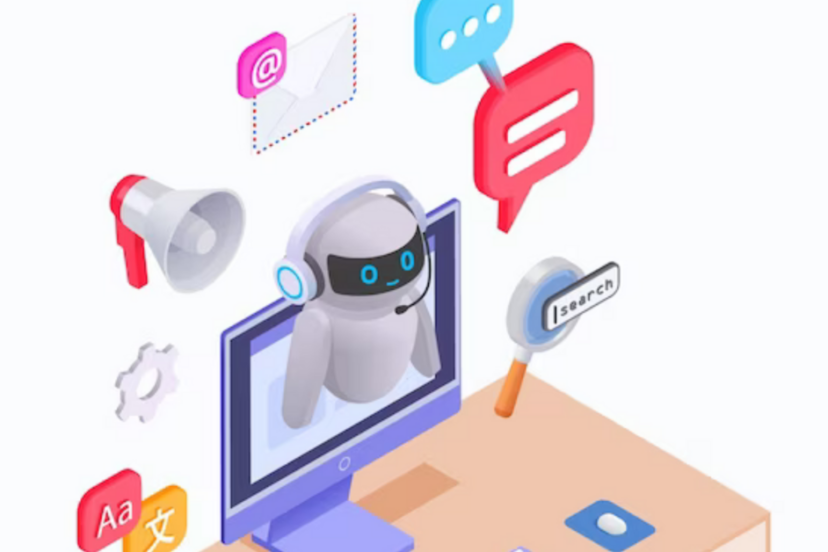AI-based Virtual Assistants: Your Smart Partners in a Connected World
A stealthy revolution is underway in the fast-paced digital age, where technology advances daily. Imagine a personal assistant who knows your every word, anticipates your requirements, and effortlessly completes your responsibilities. Ingenious AI-based virtual assistants have changed convenience and technology interaction.
AI-based virtual assistants like Amazon Alexa, Google Assistant, and Apple Siri ease our lives with each command. These intelligent computers use natural language understanding and speech recognition to make machine-human communication as natural as talking to friends.
Join us on an exciting adventure as we examine AI-based virtual assistants’ evolution, important features, and incredible ways they touch our lives. Prepare to be astounded by the limitless possibilities of these virtual companions, whether you’re an avid user or intrigued to learn their secrets.
The Evolution of Virtual Assistants
In the 1960s, MIT developed ELIZA, a computer program that could simulate a conversation by detecting and responding to text inputs. In the late 1990s, Microsoft Office Assistant Clippy was the game-changer. Many found Clippy annoying, yet it was the first widespread use of an assistant to make life easier.
Virtual assistants took a massive leap in the new millennium. Siri, released in 2011, paved the way for voice-activated gadget use. Google Now, later rebranded as Google Assistant followed Siri and offered more features and seamless integration with Google’s massive portfolio of services. Amazon soon followed with Alexa, a voice-activated virtual assistant.
Today, virtual assistants are in smartphones, smart speakers, automobiles, and appliances. They manage our hectic lives, remind us of appointments, run our smart homes, and even make us laugh.
The emergence of virtual assistants is a fascinating story of technology pushing the limits, growth, and a future where artificial intelligence makes our lives easier, more connected, and smarter. They think the greatest is yet to come!
Key Features of AI-based Virtual Assistants
Artificial Intelligence has made virtual assistants our genies, ready to simplify our lives. What makes AI-based virtual assistants unique? Three essential qualities make these modern marvels unforgettable.
1. Naturally Language Understanding
Natural language understanding underpins AI-based virtual assistants’ intuitive interactions. This technology lets virtual assistants learn and interpret human language, including ordinary commands. Natural language understanding makes conversations with Siri about the weather and Alexa about your favorite song easy and effective, just like talking to a buddy.
2. Speech Recognition
This functionality lets virtual assistants recognize and respond to voice requests. Speech recognition technology understands your voice, whether you tell Google Assistant to set an alarm or dictate a text to Siri.
3. Task Automation
Like your personal concierge, AI-based virtual assistants can complete various duties. They can automate almost every task, including reminders, emails, calls, and appointments. Your assistant is available 24/7.
Popular AI-Based Virtual Assistants
AI-based virtual assistants have become household names. Here are the top three players in the game.
A. Amazon Alexa
Alexa, Amazon’s virtual assistant, is frequently featured in Echo devices, offering hands-free voice control for tasks ranging from music playback to controlling smart home devices.
B. Google Assistant
Google Assistant, available across Android devices and Google Home, is known for its seamless integration with Google’s suite of applications and superior natural language processing capabilities.
C. Apple Siri
As the first mainstream virtual assistant, Siri offers a comprehensive set of functionalities to iPhone and other Apple device users, from sending texts to providing navigation.
The Importance of AI-based Virtual Assistants in Today’s World
Customer Service
AI-powered VAs are revolutionizing customer service, handling inquiries 24/7, and providing instant responses. This enhances customer satisfaction and reduces the workload for customer service reps.
Efficiency in Personal Tasks
Ever felt like you could use an extra pair of hands? AI-based VAs are your answer, managing our daily tasks efficiently and leaving us more time to focus on what truly matters.
Challenges of AI-based Virtual Assistants
Data Privacy and Security:
Virtual assistants collect and process personal data, raising concerns about privacy breaches and data security. Ensuring robust encryption and adherence to privacy regulations is crucial.
Accuracy and Understanding:
Virtual assistants sometimes struggle to accurately understand complex queries, leading to frustration and incorrect responses. Improving natural language processing (NLP) capabilities is an ongoing challenge.
Contextual Understanding:
Grasping context across different conversations and contexts remains a challenge. Virtual assistants can misinterpret user intent, leading to inaccurate responses.
Ethical Concerns:
Virtual assistants can inadvertently propagate biases in their training data, raising ethical concerns about fairness, diversity, and inclusivity.
Lack of Emotional Intelligence:
Virtual assistants lack emotional intelligence and empathy, limiting their ability to provide nuanced responses in emotionally charged situations.
Future of AI-Based Virtual Assistants
The potential for AI-based virtual assistants is immense as we look to the future.
Hyper-Personalization:
AI-driven virtual assistants will become experts in understanding individual preferences, behaviors, and needs, delivering hyper-personalized experiences that cater to each user’s unique requirements.
Multilingual and Cultural Adaptation:
Future virtual assistants will break language barriers effortlessly, seamlessly communicating in multiple languages and adapting to cultural nuances, making global communication more accessible.
Emotional Intelligence:
The next generation of virtual assistants will develop emotional intelligence, capable of understanding and responding to human emotions, enabling more empathetic and meaningful interactions.
Contextual Continuity:
Virtual assistants will excel at maintaining context across conversations, remembering previous interactions, and understanding complex, multi-step requests without losing track.
Advanced Cognitive Abilities:
Future virtual assistants will possess advanced cognitive abilities, including reasoning, critical thinking, and problem-solving, allowing them to assist with more complex tasks.
Business Applications:
In the business world, virtual assistants will play a pivotal role in decision-making, data analysis, and customer interactions, driving efficiency and innovation across industries.
Healthcare and Wellness:
Virtual assistants will aid in healthcare management, monitoring patients’ health conditions, offering medical advice, and providing emotional support.
Collaboration with Humans:
Virtual assistants will collaborate with humans on creative projects, research, and problem-solving, augmenting human capabilities and expanding the boundaries of innovation. The interface between humans and virtual assistants will become even more natural, incorporating gesture recognition, haptic feedback, and voice modulation for richer interactions.
Enhanced Security and Privacy:
Future virtual assistants will prioritize data security and privacy, integrating advanced encryption and authentication mechanisms to protect user information.
Environmental Integration:
These assistants will help manage intelligent homes, conserving energy and resources by learning user habits and making energy-efficient recommendations.
Education and Learning:
Virtual assistants will become indispensable learning companions, offering personalized educational content, tutoring, and guidance to students of all ages.
Ethics and Regulation:
As virtual assistants become more intelligent, ethical considerations and legal frameworks will become increasingly important in ensuring responsible AI development and use.
Conclusion
Our investigation of AI-based virtual assistants has revealed their evolution, key features, and tremendous impact on our lives. AI, Natural Language Understanding, and Speech Recognition have made these intelligent companions part of our daily lives.
But the road continues. We should expect better, more responsive, and tailored virtual assistants as AI and machine learning improve. The potential is enormous and boundless. AI-based virtual assistants are here to stay and change our lives in ways we can’t imagine. These AI-powered partners unlock ease, efficiency, and innovation as we evolve into a digital world.
In a world where time is a luxury and efficiency is essential, aren’t we lucky to have these AI-powered virtual companions to navigate life? AI-based virtual assistants will make life easier in the future!
FAQs
What tasks can AI-based virtual assistants perform? AI-based virtual assistants can create reminders, play music, provide weather updates, answer queries, and operate smart home gadgets.
Are AI-based virtual assistants secure? Most AI-based virtual assistants have built-in security, but users should be conscious of their data and device privacy settings.
How does an AI-based virtual assistant understand human language? NLU technology helps AI-based virtual assistants understand and respond to human language.
Can AI-powered virtual assistants speak many languages? Many AI-based virtual assistants speak many languages.
What is the future of AI-based virtual assistants? AI and machine learning promise the future. Virtual assistants will improve intelligence, responsiveness, and personalization.




